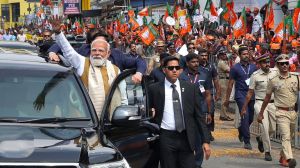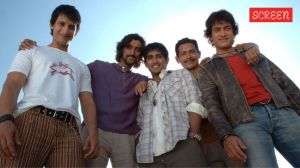When Mamata does business with Basu
The Left in Bengal tries Track II political diplomacy with the Trinamool leader to protect its model of rapid industrialisation in the state

When Jyoti Basu called up Mamata Banerjee last week and invited her for talks, the veteran Marxist leader opened a new chapter in the 30 years of CPM rule in Bengal. He,
after all, had a political legacy to protect. The model of rapid industrialisation Buddhadeb Bhattacharjee is pushing was in fact shaped by Basu during his chief-ministership.
But what was intriguing about the Basu-Banerjee meeting was that the two leaders had never met before to resolve a conflict. In fact, each had viewed the other with something bordering on contempt. For Basu, Mamata was 8220;that woman8221;. For Mamata, Basu was 8220;an autocrat8221;, under whose rule Bengal got only 8220;Nandan a cultural complex and Chandan Basu8217;s son8221;. Therefore, when Mamata Banerjee, responding to call from Basu, stepped into his Indira Bhavan residence this week, she was making a history of sorts.
The Basu-Mamata talks mark a decisive change in the way politics has been practised in the state. But this change did not come easy. As the two arch political rivals engaged with each other, analysts began interpreting it as the CPM blinking before an adversary that was growing in stature every day, with Buddhadeb Bhattacharjee wilting under pressure. But as the backdrop to this dramatic development gradually becomes clearer, many among them were forced to re-think.
When senior CPM leaders broached the idea of a talk with Mamata Banerjee with Basu as the mediator, the party patriarch did not immediately approve of the idea. But Biman Bose, Buddhadeb Bhattacharjee and other senior leaders did not give up. An emergency secretariat meeting was called and the proposal discussed threadbare. It was then formally approved. Secretariat members like Gautam Deb reportedly drew parallels, saying: 8220;If Pakistan and India can sit and talk Kashmir, why can8217;t the CPM and Trinamool talk Nandigram and Singur ?8221; After that, Basu was approached once again and he, with his unwavering loyalty to the party, agreed to give the idea a shot.
For Buddhadeb Bhattacharjee getting Basu at the negotiating table was as important as getting Mamata Banerjee to respond. With Basu steering the talks, Bhattachajree is himself largely insulated from the intra-party divisions he had been facing in his drive for rapid industrialisation. At times, Basu himself had been critical of Buddha during Singur land acquisition process and subsequently during the Nandigram crisis. This points to a contrast between the Bengal CPM and its Kerala counterpart. The fissures in the Kerala CPM keep widening, but here in Bengal, both senior leaders have been more accommodative of each other. In this instance, Basu certainly rose to the occasion.
For Buddhadeb Bhattacharjeee, the development could not have been more positive. After the setbacks in Nandigram, he is showing the willingness to make adjustments and concessions as he moves forward. One cannot always have one8217;s way, Buddha must have realised, even if he has an overwhelming mandate of 230-plus in an assembly of 294. He also probably realises that he has nothing to lose by conceding political space to Mamata Banerjee. By inviting her to the meeting, the CPM has given her the status for being the main Opposition leader in the state. Through this exercise in Track II diplomacy, neither side feels it has lost face or dignity.
The CPM and Buddha can ill afford to end this initiative abruptly. Now it has to offer some credible concessions to Mamata to flaunt before her supporters. A compromise formula would necessarily have to be worked out. A partial return of land is not ruled out at this stage. The state government affidavit before the Calcutta High Court on the status of Singur land acquisition shows that 697 acres are required for the main factory; the rest is for ancillary units. A 8216;reorganisation8217; of the project site is also on the cards.
The Tatas should be more than happy if the talks work, even if it means a slight reorganisation of plans. It might save the organisation the embarrassment of witnessing several thousand policemen standing guard at the project site every day to tackle a crowd of disgruntled people who continue to protest. One potential danger, however, remains. There are numerous smaller outfits, mainly composed of Naxalites, that had been associated with the Singur and Nandigram agitations. They will certainly continue to be minor irritants.
But all said and done, Bengal8217;s politics is poised to take a new turn, with the ruling party signalling that it had realised that it needs to engage rather than just ride roughshod over the Opposition. Pragmatism is at work, not rhetoric, when Basu admits there is logic in 8220;Mamatadevi8217;s words8221; and when Mamata reciprocates: 8220;He is senior, being honest. And I respect him.8221;
- 01
- 02
- 03
- 04
- 05































